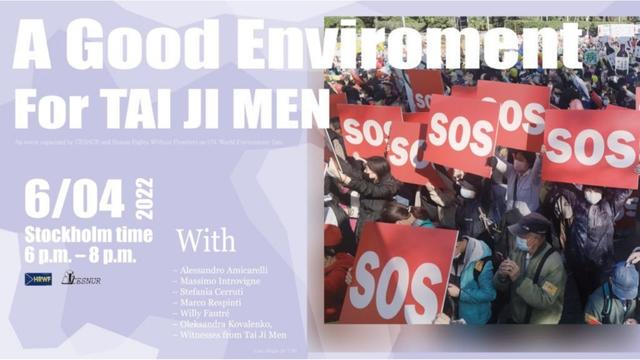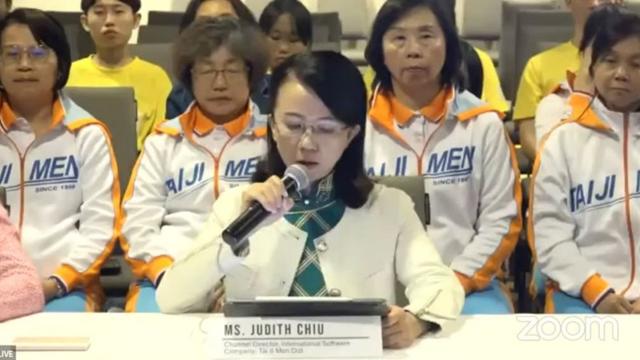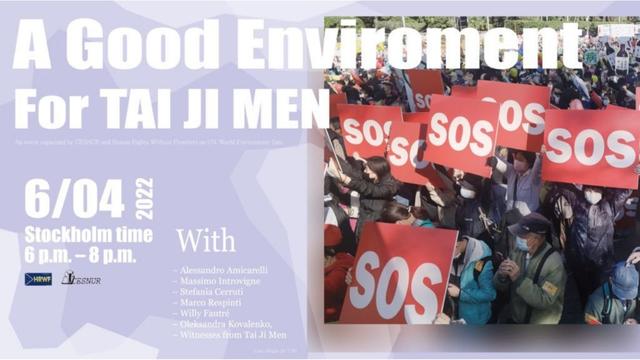On the eve of United Nations World Environment Day, an international webinar focused on how a “good environment” also requires non-corrupt institutions.
by Daniela Bovolenta

On June 4, 2022, on the eve of the 2022 United Nations World Environment Day, CESNUR, the Center for Studies on New Religions, and Human Rights Without Frontiers organized one of their bimonthly webinars, on the theme “A Good Environment for Tai Ji Men.” Introducing the webinar Alessandro Amicarelli, a London-based human rights lawyer and the President of FOB, the European Federation for Freedom of Belief, greeted those participants who were connected from Sweden, where they were attending the Stockholm+50 event, organized by the United Nations in the week of World Environment Day fifty years after the historical UN Conference on the Human Environment held in 1972 in the same Swedish capital.
Amicarelli introduced a video on the tax history of France, showing how the tax reforms of Jean-Baptiste Colbert in the 17th century made France rich and powerful. Unfortunately, King Louis XIV reneged them, setting in motion a chain of events that eventually led to the French Revolution and the decadence of what was once a great world power. Amicarelli then introduced the first three speakers.

Massimo Introvigne, an Italian sociologist who serves as managing director of CESNUR and editor-in-chief of Bitter Winter, presented Pope Francis’ 2015 encyclical “Laudato Si’,” the longest encyclical in the history of the Catholic Church, and its connection with the ecological message and poetry of Francis of Assisi. He noted that Pope Francis’ text mentions three dimensions of ecology: environmental ecology, cultural ecology, and the ecology of human life. They are part, Introvigne said, of an “integral ecology,” which maintains that institutions are also components of a wider ecosystem.
The enemy of ecology, Pope Francis said, is not technology but “technocracy,” i.e., the ideas that “experts” and bureaucrats are more reliable than elected politicians and should take the most important decisions. Privileging competence may look like a good idea, Introvigne observed, but technocracy results in a non-democratic system where “experts” become untouchable and all-powerful. This is also true for tax bureaucrats who, claiming they are the best experts on taxes, refuse any political or judicial control, Introvigne stated, as it was clearly demonstrated by the Tai Ji Men case.

Stefania Cerruti, external relations manager of MEDIS, the Major Emergencies and Disasters International School, presented some principles of the scientific study of disasters, the matter in which her organization is specialized. She recalled her meeting with Dr. Hong Tao-Tze, the Shifu (Grand Master) of Tai Ji Men, in 2019, and how impressed she was by his words that the key to disaster resolution lies in the conscience.
In our materialistic word, Cerruti said, many may find these words unrealistic. However, they resonate with the modern science of the study of disasters, which maintains that even in the case of “natural” disasters how governments and bureaucrats manage them, with conscience or otherwise, makes their consequences less or more severe. Cerruti concluded by observing that Tai Ji Men had to confront a “tax disaster.” She said that tax disasters may seem less dramatic than epidemics or earthquakes, but they also cause “suffering, economic ruins, and even suicides,” and should be seriously confronted.
Marco Respinti, an Italian journalist who serves as director-in-charge of Bitter Winter, introduced the notions of “husbandry” and “gardening” as they emerge from the works of the British novelist J.R.R. Tolkien, the celebrated author of “The Lord of the Rings.” Respinti focused on one character, Samwise Gamgee, or Sam, who is in fact a gardener, and noted how trees and “shepherds of trees” also play an important role in Tolkien’s fictional universe. Forests are forests, and gardens are gardens, calling us to respect nature, but they are also metaphors of human education and self-cultivation.
The full video of the webinar A Good Environment for Tai Ji Men.
Through their efforts at self-cultivation and their international promotion of education, Dr. Hong and the dizi (disciples) of Tai Ji Men contributed to the creation of a global “good environment,” Respinti said. At the same time, they were not granted in Taiwan a “good environment” where they could pursue their noble activities in peace, because of persecution and tax harassment.
Willy Fautré, co-founder and director of Human Rights Without Frontiers, presented the eight installment of the series “Unbreakable Bonds,” a detailed history of the Tai Ji Men case. The installment focused on the seven major violations of law by Taiwan’s National Taxation Bureau (NTB). Then Fautré introduced the seven dizi who offered their testimonies.

Chen Yi-Jing, an assistant professor who majored in Environmental Research, recalled the 1972 first United Nations Conference on the Human Environment, and the different positions dividing “optimists” from “pessimists” about the possibility of avoiding an ecological catastrophe. Chen was among the pessimists, she said, until Dr. Hong and Tai Ji Men persuaded her that through a balance between ecology and spirituality real results can be achieved. She also mentioned the recent review in Taiwan of compliance with the two United Nations covenants on human rights, which Taiwan incorporated into its domestic law in 2009, and the related conference where several voiced denounced the persecution of Tai Ji Men.
Tun Nu-Nu, a senior caregiver and a Myanmar Chinese who emigrated to Taiwan and then to California, reported about the benefits she and her family derived from practicing qigong as Tai Ji Men dizi. She also mentioned Tai Ji Men activities on behalf of world peace and happiness, insisting on the more than 1,000 episodes of the TV program “Energy Family,” which promotes both traditional Chinese culture and physical and mental health. At the same time, as a native of Myanmar, a country with significant human rights problems, Tun feels strongly about the Tai Ji Men case and regards it as another issue of “state violence.”
Liu Mei-Yin, a music educator, discussed global warming and pollution issues, and the international efforts for a sustainable development. They are not unrealistic, she said, because “the power of a single human being is tiny, but collective power is huge.” She recalled how she accompanied Dr. Hong in 2016 to the 52nd International Folklore Festival of Gulpilhares in Vila Nova de Gaia, Portugal, and participated by playing violin in a performance of “Amazing Grace” at the Corpus Christi Monastery. The power of music led the audience to pray and cry across cultural borders, proving that progress toward peaceful dialogue and cooperation is possible. Yet, as other dizi did, Liu noted that while acknowledging that dizi were effective ambassadors of Taiwanese culture throughout the world, the government of Taiwan mistreated them at the same time through the tax case. But here again, “the power of a single human being is tiny, but collective power is huge,” and the efforts of the dizi and those who support them may one day change the situation for the better.

Jessica Lu, an undergraduate student at Case Western Reserve University in Ohio, recalled her participation as a Tai Ji Men dizi in international events promoting world peace and sustainable development. She went to the faraway island of Kiribati and she was now in Stockholm for the Stockholm+50 event. These were happy and uplifting experiences, Lu said, but she contrasted them with the sadness that moved her to cry when protesting for the Tai Ji Men case in 2021 in Washington DC in front of the Taipei Economic and Cultural Representative Office in the United States (TECRO). Despite how much this dramatic contrast of experiences hurt her, Lu vowed to continue Tai Ji Men’s battle for a “good environment” through both promotion of a culture of love and peace and protest against injustice.
Jenner Lin, chairman of Taiwan Eco-Friendly Rice Products Promotion Association, discussed global warming and recent environmental disasters, noting that to solve these problems in 2015 the United Nations announced the “2030 Sustainable Development Goals.” While not being a member state of the United Nations, Taiwan also formulated its own “Taiwan Sustainable Development Goals.” Yet, Lin noted, the right to a “wholesome and culturally comfortable environment” also includes freedom of religion or belief and the right of self-cultivating ourselves as we deem fit. This was denied in the Tai Ji Men case, Lin said, which was also a violation of the citizen’s environmental rights.
Judith Chiu, the channel director for an international software company based in the United Kingdom, also traveled to Sweden for the Stockholm+50 event. She reviewed a number of disasters that occurred in 2021, including the spread of new mutations of COVID-19. She believes that the imbalance of people’s hearts and the lack of conscience is a main cause of all these disasters. She is willing to travel thousands of miles, Chiu said, to help spreading Dr. Hong’s call to return to conscience. She also fully understands that the tax injustice vested on Tai Ji Man derives from a lack of “conscientious administration” and is part of the same global problem.

Phyllis Huang, a U.S. certified public accountant and the President of the Paramitas Foundation, a grant-making foundation based in Saratoga, California, which supports educational and charitable activities within the Taiwanese-American community and beyond, traced the story of the United Nations World Environment Day as a day of observance established to denounce the imbalance in the earth’s ecology. She noted that, as she learned from Dr. Hong, the same imbalance exists in individuals; indeed, that there is a need to restore the yin and yang balance is a key teaching of Tai Ji Men. Huang went to the Stockholm+50 event to help spreading this message of balance, but was also happy to participate in this webinar, she said, and testify that the injustice of the Tai Ji Men case derive from a fundamental imbalance as well.

Oleksandra Kovalenko, from the Ukrainian Association of Religious Studies, offered the conclusions of the webinar. She reviewed the different papers and offered her testimony as a Ukrainian scholar who has witnessed how war and injustice also cause ecological disasters. This made her sensitive to all instances of injustice and arrogance, she said, and her studies in the field of freedom of religion or belief led her to an interest in Tai Ji Men and its fight for justice.
The event concluded with an animated video on COVID-19 prevention and a beautiful performance, “An Era of Conscience,” by the dizi who traveled to Stockholm.
Source: Bitter Winter

